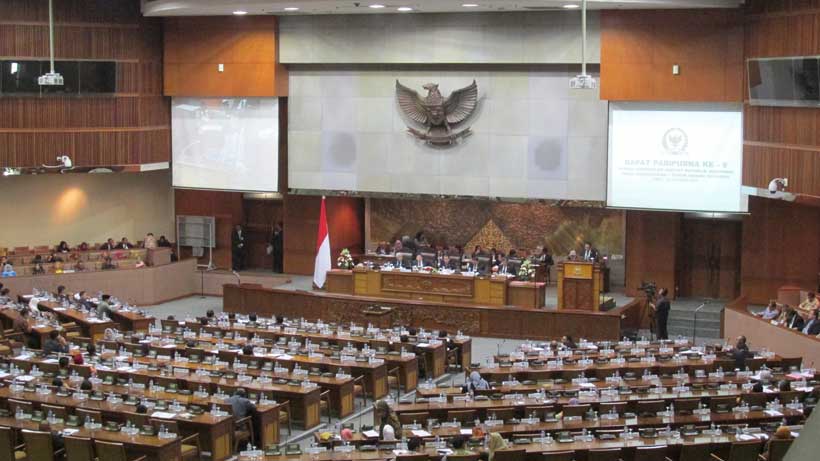In Indonesia, power is defined to how much degree can you extract a state’s resources or known as balik modal (profit from investment). The nature of extractive state is based on the purpose of the state that was introduced during colonialism, especially the midst of modernization and introduction of colonial liberalism in the 19th century. During the Van den Bosch era, the East Indies was regarded as a staatsbedrijf (state corporate) that should produce profits for the stakeholder, which is the metropole, the Netherlands. This logic transcends into the modern Indonesian state where Indonesia is regarded as an untapped resource ready to be exploited, rhetorically for the common, but realistically for the few.
According to Anderson (1983), Indonesia is an old state where there is continuity of colonial logic after the Sukarno period (1945-65), where the New Order is equivalent with zaman normal (normal era) that connotes the Dutch East Indies. The counter-revolutionary regime reimplemented Dutch policy to manage the state. The result is that Indonesian politics is a mix of patron-clientelism and paternalistic state, similar to the Dutch indirect rule that in the early 20th century tried to combine local aesthetics of power with European modernity.
What does it manifest? In Kuipers and Warburton (2024) research on Indonesian election, democracy looks like a marketplace that values the highest bidder with strong capital rather than programmatic and merits of the candidate. They found out that in Indonesian elections, capitals correlate with the chance to succeed in the election where the fund is used to enlarge clientelism and advertisement without much agenda difference.
Reflecting back to Heeren XVII, the VOC shareholders who controlled the Dutch East Indies around 16-17th centuries, the staatsbedrijf is controlled by whomever has a larger share of capital. It is democracy where everybody can contribute, the only barrier is it is only for people who have thick pockets. The power of staatsbedrijf rests on the ability to mobilize pre-existing private resources, similar to Indonesian election costs that require expensive expenditure in hope to extract much state resources during post-election. Indifference to Heeren XVII, Indonesian parliament is a place to balik modal, where election is to extract state’s resources in the form of state’s funds, concession, and maintaining economic power against the clients, Indonesian commoners.
What Indonesian parliament positions’ offer is to monopolize the power of extraction. As an extractive state, Indonesian parliament is the contract supplier to form monopoly and oligopoly of a resource. Corruption and nepotism are essential social reproduction of power and it is paternalistic as clients will get concessions such as mining and contracts for the state’s programmes. The monopolization of state’s control through regulation is similar to the practice of Heeren XVII that controlled the monopoly of trade and war in Indonesia during its high time.
Realizing this, Indonesia needs to reflect and reform our election to decolonialize our system of power so that Indonesia has a genuine democracy where the candidate with the best programme can win without much capital being thrown out to entice the electorate. When only the rich can win the election, will Indonesians get the best policy for themselves for the long-term? This is the question that faces us as Indonesian who crave for the genuine change.
If the members of Parliament (MP) focus on balik modal, Indonesians at large will not get the benefit of democracy as it is intended in our constitution and state ideology, Pancasila. When the system is broken, there is a need for reform of thinking that Indonesia is not only an extractive state, but a democratic state that upholds human rights and works for common benefits. Resource extraction is essential for the working of the nation-state, but it needs to be complementary rather than essential in the state service. When the state is confined to being solely extractive in nature, the promise of Sustainable Development Goals (SDG) to face the future become obsolete. In this realization, the election of MPs needs to have a better system that ensures the better programmed candidate wins rather than the one who is effective in capitalizing their resource for the election.
In decolonializing the Indonesian state and its government, Indonesia needs to look at the history to identify the inherited system that does injustice and demoralize the modern Indonesian government. Ahistorical reform will result in keeping coloniality alive in the post-independence system where it contradicts with the dreams of modern Indonesia that is democratic and based on merits rather than nepotism and patron-clientelism. By no means it is an easy task as Kuipers and Warburton has explored earlier, the system of buying votes is entrenched till the smallest part of the Indonesian legislature. Yet it can be done one by one through extensive election reform that delimits capital that is being spent on the election and threshold system that is currently used to block new arrivals and small parties.
I think Indonesia should discontinue the ‘invented’ tradition that has been established during the colonial era. It is the job of Indonesians to seek to reform our young democracy in the hope that in the future, our democracy can offer stability for every Indonesian who lives and works fruitfully. To manage Indonesian resources, Indonesians should align with SGDs as climate change and poverty are difficult tasks to be realized for the government and Indonesian citizens alike. There should be a break from the past to create an imagined future that allows Indonesians to thrive in their own home with resources that can be used for long-term development.
